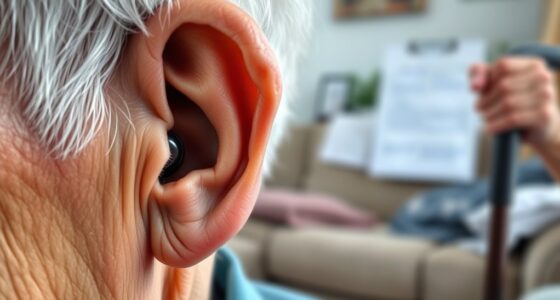To pinpoint the cause of your tinnitus, you’ll need a thorough evaluation that includes hearing tests, examining ear structures, and checking for neurological or vascular issues. Factors like ear infections, blood flow problems, medications, or systemic health conditions can all play a role. Understanding these interconnected causes helps guide effective treatment. If you want to explore how each factor contributes and what steps to take, keep exploring these key aspects.
Key Takeaways
- Evaluate audiological profiles to distinguish between cochlear, neural, or central auditory pathway causes.
- Identify vascular or circulatory abnormalities, such as pulsatile tinnitus linked to blood flow issues or vascular tumors.
- Assess medication history for ototoxic drugs that may induce or worsen tinnitus.
- Consider systemic health conditions like hormonal imbalances or metabolic syndromes affecting neural activity.
- Investigate neurological disorders, brain reorganization, or neural pathway disruptions contributing to tinnitus perception.
Audiological Assessments and Hearing Loss Patterns

Audiological assessments are vital for identifying the underlying causes of tinnitus, as they help determine the presence and extent of hearing loss. When conducting these evaluations, you’ll often consider not only auditory thresholds but also psychological factors that influence your experience of tinnitus. A psychiatric evaluation may reveal underlying psychological issues, such as anxiety or depression, that can intensify tinnitus perception. Recognizing these factors is essential because they can affect how you cope with your symptoms and influence treatment outcomes. Additionally, understanding color accuracy and its impact on visual perception can aid in comprehensive assessments, especially when visual stimuli are used during therapy. Recognizing these factors is essential because they can affect how you cope with your symptoms and influence treatment outcomes. By understanding both hearing loss patterns and psychological influences, you gain a thorough view of your condition. This approach guarantees that your diagnosis considers the full scope of factors contributing to tinnitus, leading to more targeted and effective management strategies.
Otologic and Middle Ear Conditions

Otologic and middle ear conditions are common contributors to tinnitus, often resulting from structural or functional issues within the ear. Problems with the inner ear or Eustachian tube can disrupt normal hearing and cause ringing. For example, Eustachian tube dysfunction may lead to pressure changes, while inner ear issues like cochlear damage affect auditory signals. Understanding these conditions helps differentiate tinnitus causes. Additionally, awareness of sound processing mechanisms within the ear can aid in diagnosis.
Neurological Disorders Associated With Tinnitus

Neurological disorders can disrupt the neural pathways involved in hearing, leading to tinnitus. Changes in the auditory cortex may also alter how you perceive sound, contributing to your symptoms. Additionally, certain neurological diseases are linked to tinnitus, highlighting the importance of a thorough neurological assessment.
Neural Pathway Disruptions
Disruptions in neural pathways can directly lead to tinnitus by interfering with how the brain processes sound signals. When there’s cochlear damage in the inner ear, fewer signals reach the auditory nerve, creating a disconnect. This disruption can cause the brain to misinterpret or generate phantom sounds, resulting in tinnitus. Neural pathway issues may also stem from demyelination or nerve degeneration, which impair signal transmission between the inner ear and the brain. If these pathways are compromised, the brain may compensate by amplifying spontaneous neural activity, producing the perception of ringing or buzzing. In cases of cochlear damage, the altered input distorts neural communication, making it a key factor in the development of tinnitus symptoms. Additionally, data analytics can be utilized to better understand individual neural disruptions and tailor targeted treatments.
Auditory Cortex Changes
Changes in the auditory cortex can markedly contribute to tinnitus, especially in individuals with neurological disorders. These changes often involve cortical reorganization, where the brain’s auditory areas adapt in response to hearing loss or damage. This reorganization can lead to abnormal neural activity, creating the perception of phantom sounds. You might notice that the auditory cortex begins amplifying or misinterpreting signals, fueling tinnitus symptoms. Factors such as nerve injury, stroke, or neurodegenerative conditions can trigger these cortical adjustments. Understanding this link helps explain why tinnitus persists even when peripheral hearing loss is addressed. Recognizing cortical reorganization’s role emphasizes the importance of targeting brain plasticity in treatment. Neural plasticity plays a crucial role in how these changes develop and may offer avenues for therapeutic intervention.
Neurological Disease Links
Alterations in brain function due to neurological disorders often play a significant role in the development of tinnitus. Conditions like multiple sclerosis, epilepsy, or traumatic brain injuries can disrupt neural circuits, leading to abnormal auditory perceptions. Psychological factors, such as stress or anxiety, may amplify tinnitus symptoms, while environmental influences like exposure to toxins or head trauma can trigger neurological changes. You might notice that certain neurological diseases worsen your tinnitus, especially during periods of heightened psychological stress or after environmental insults. Understanding these links helps you recognize that neurological disorders aren’t isolated issues but interconnected with psychological and environmental factors. Addressing these elements, including brain function alterations, can improve management strategies and reduce the impact of tinnitus on your daily life.
Vascular and Circulatory System Influences

Vascular issues like murmurs can cause noticeable tinnitus by affecting blood flow near your ears. Variations in blood flow or circulatory system disorders may also influence the intensity and quality of the sounds you hear. Understanding these vascular factors helps you identify potential underlying causes of your tinnitus. Additionally, structural changes in blood vessels may alter circulation and contribute to tinnitus symptoms.
Vascular Murmurs and Tinnitus
Vascular murmurs can sometimes manifest as tinnitus, especially when turbulent blood flow near the ears stimulates the auditory system. You might notice pulsatile sounds that sync with your heartbeat, indicating a vascular origin. Carotid bruits, caused by narrowed arteries, can produce these sounds and contribute to tinnitus perception. These murmurs are often heard as whooshing or swishing noises in the ear. Understanding these clues helps differentiate vascular causes from other tinnitus sources. Factors influencing vascular murmurs include blood flow velocity, vessel wall abnormalities, and systemic blood pressure. Recognizing pulsatile tinnitus linked to vascular murmurs is essential for proper diagnosis and treatment. Addressing underlying circulatory issues can often alleviate the tinnitus caused by these vascular sounds. Additionally, vascular murmurs are typically influenced by systemic factors such as blood viscosity and heart rate, which can modify the intensity of the sounds heard.
Blood Flow Variability Impact
Blood flow variability plays an essential role in the development and perception of tinnitus by influencing circulatory dynamics near the auditory system. Fluctuations in blood pressure can cause changes in blood flow, impacting how you perceive sounds. When blood pressure rises or falls unexpectedly, it can lead to arterial constriction or dilation, affecting blood supply to the inner ear structures. These variations may cause pulsatile tinnitus or other abnormal sensations, as the auditory nerves respond to changing blood flow. Consistent blood flow is critical for normal hearing function, so even minor fluctuations can trigger symptoms. Additionally, advances in robotics integration are improving diagnostic tools for vascular-related tinnitus, aiding in more precise treatment approaches. Understanding how blood pressure fluctuations and arterial constriction influence circulation helps in identifying vascular contributions to tinnitus, guiding targeted treatment strategies.
Circulatory System Disorders
Disorders of the circulatory system can considerably influence tinnitus by disrupting blood flow to the inner ear and auditory pathways. Elevated blood pressure or arterial stiffness can impair circulation, leading to reduced oxygen and nutrient delivery. These changes may cause pulsatile tinnitus or worsen existing symptoms. You might notice that tinnitus worsens during blood pressure fluctuations or with vascular conditions like atherosclerosis. Vascular abnormalities, such as carotid artery disease or vascular tumors, can also produce abnormal sounds that mimic tinnitus. Managing blood pressure and addressing arterial stiffness are vital steps in mitigating vascular-related tinnitus. Recognizing circulatory system influences helps in accurate diagnosis and targeted treatment, improving your quality of life. DE – Patchology.ORG Vascular health plays a crucial role in maintaining proper blood flow and preventing tinnitus symptoms.
Pharmacological and Ototoxic Factors

Certain medications and chemicals can induce or worsen tinnitus, making it important to recognize their potential impact. Medication side effects are a common cause, especially with drugs like aspirin, NSAIDs, and certain antibiotics. These medications may cause temporary or persistent tinnitus due to their ototoxic properties. Drug toxicity can also lead to cochlear or auditory nerve damage, intensifying tinnitus symptoms. Recognizing these factors involves reviewing your medication history carefully. If you notice tinnitus after starting a new drug, consult your healthcare provider to evaluate whether medication adjustments are necessary. Avoid stopping medications suddenly without medical advice. Being aware of medication-related tinnitus helps differentiate it from other causes and guides appropriate management to prevent further auditory damage.
Systemic and Metabolic Contributions

Systemic and metabolic factors can substantially influence tinnitus, often through their impact on the auditory system’s overall health. Hormonal imbalances, such as thyroid issues or adrenal dysfunction, may disrupt neural activity and cause ringing. Metabolic syndromes, including diabetes and hypertension, impair blood flow to the cochlea, leading to dysfunction. These conditions can also cause oxidative stress, damaging inner ear structures. Recognizing these contributions helps you identify underlying health issues that may be treatable. Glycolic acid has been shown to support skin health by promoting cell turnover and reducing signs of aging, illustrating how targeted treatments can address specific conditions.
Frequently Asked Questions
Can Psychological Factors Influence Tinnitus Perception?
Psychological influences can profoundly affect how you perceive tinnitus. Your mental state, including stress or anxiety, can modulate perception, making the ringing seem louder or more intrusive. Stress and emotional factors influence perception modulation, often intensifying tinnitus symptoms. By managing psychological factors, you might reduce the severity or annoyance of tinnitus. Techniques like relaxation, counseling, or cognitive-behavioral therapy can help you control perception and improve your quality of life.
How Does Age Affect Tinnitus Diagnosis?
Ever wonder how age influences tinnitus diagnosis? As you age, you’re more likely to experience age-related hearing loss, which is a vital risk factor for tinnitus. Older adults often report more persistent or severe symptoms, making age a essential consideration. Recognizing these age-related changes helps healthcare providers distinguish tinnitus causes, ensuring tailored treatment. So, understanding how age impacts tinnitus can lead to better management and improved quality of life for those affected.
Are There Environmental Triggers for Tinnitus?
Environmental triggers can markedly influence your tinnitus. Exposure to loud environmental noise, like concerts or machinery, can worsen or trigger symptoms. Chemical exposures, such as loud fumes or certain medications, may also contribute. You should be mindful of these factors, protecting your ears with earplugs in noisy settings and avoiding harmful chemicals. By managing your environment, you can help reduce the severity or frequency of tinnitus episodes.
What Role Does Genetics Play in Tinnitus Causes?
You might think genetics is just a fancy word, but it actually plays a surprising role in tinnitus causes. A genetic predisposition means hereditary factors could make you more vulnerable. Ironically, while loud noises or health issues are often blamed, your genes might secretly be pulling the strings behind the scenes. Understanding this connection helps you see tinnitus as not just environmental but also rooted in your unique genetic makeup.
Can Lifestyle Choices Impact Tinnitus Severity?
Your lifestyle choices can definitely impact tinnitus severity. By making diet modifications, such as reducing caffeine and salt intake, you may find your symptoms lessen. Prioritizing good sleep hygiene helps your body manage stress and noise sensitivity. Regular exercise and avoiding loud environments also support your hearing health. These small changes can make a significant difference in managing tinnitus and improving your overall quality of life.
Conclusion
When diagnosing tinnitus, you need to keep all possibilities on the table. By carefully examining hearing patterns, ear conditions, neurological issues, and systemic factors, you get a clearer picture. Remember, the path to effective treatment isn’t always straightforward, so don’t put all your eggs in one basket. Stay thorough and patient—you’ll find the cause and help your patient get back to silence. After all, sometimes you have to look under every stone to find the answer.









